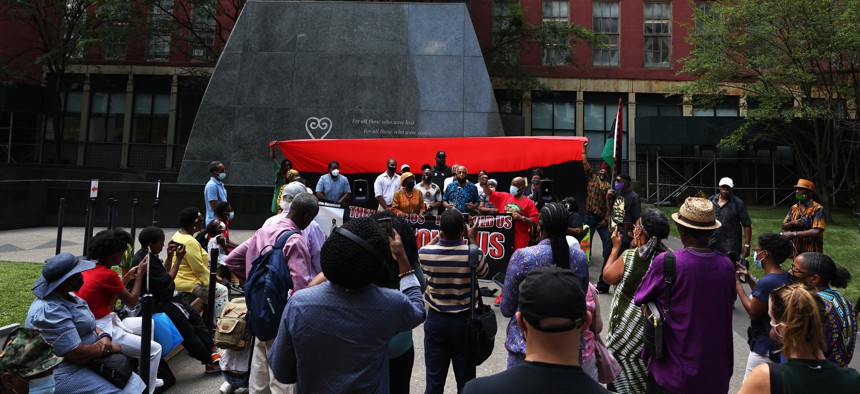Opinion: New York’s reparations commission is a beacon of hope for all races
A white New Yorker on how this is an opportunity for the state to reckon with its history and move beyond divisive narratives.

In a transformative move towards healing and unity, New York state's Reparations Commission emerges as a beacon of hope for all its residents – Black, brown, and white. Across races, backgrounds, and generations, most New Yorkers want to make this a state where all people can live with dignity, freedom and equality. Yet for centuries, a handful of people in power have used anti-Black racism to dehumanize people, divide working people and to consolidate rule for a wealthy, white few.
The Reparations Commission will investigate the long history of slavery and anti-Black practices in New York, from the slave markets on Wall Street to the proliferation of discriminatory policies that have fueled mass incarceration and economic disparity.
This chapter was not just a footnote in history; it was central to the development of New York and has perpetuated discrimination and systemic racism that persist to this day. In Buffalo, we see clearly how deeply anti-Black racism is still embedded in the fabric of our state. Just two years ago, a young white man killed 10 Black people at a supermarket here, influenced by white nationalist ideologies and movements backed by a MAGA faction in office and in the media.
This commission isn't merely about acknowledging the injustices of the past; it's a decisive step toward dismantling a deep-rooted strategy of racial division that has long been stoked by those in power for their advantage. The loudest voices against this historic commission are the same people stoking racism to push an agenda that harms all of us.
MAGA Republicans will try to turn white people against acknowledging our history and making equality real for Black people. Nothing could be further from the truth. Racism is a powerful tool used by the 1% to exploit communities based on what we look like or where we come from, and to undermine the solidarity we need to improve the lives of all of us.
Let us be clear - the politicians, CEOs, and pundits against reparations are the same people against providing affordable housing, addressing the opioid crisis with compassion and resources, and fully funding our public schools.
As a white Buffalonian, I support the commission's efforts to tell the truth and remedy the harms that have been committed against Black people in our community. Growing up in a working-class union family, I learned early on that our fates are intertwined and that solidarity across lines of difference is how all of us get the things we need in our lives to live with dignity, respect and freedom.
W.E.B. Du Bois, writing to white people nearly a hundred years ago said, “My rise does not involve your fall. No superior has interest in inferiority. Humanity is one and its vast variety is its glory and not its condemnation.”
This profound insight lays the foundation for the transformative journey New York State embarks upon with the reparations commission. This is an opportunity for us to reckon with our history and move beyond the divisive narratives that have been used to control our lives and pit us against one another. Repairing the ongoing impacts of anti-Black discrimination on New Yorkers since enslavement is good for all of us. As the reparations commission embarks on this historic task, us white New Yorkers should welcome it as an opportunity for healing and the roadmap to building a state that makes good on the promise of freedom, equity and dignity for all.
Erin Heaney is the executive director of Showing Up for Racial Justice, the largest racial justice organization explicitly organizing white people in U.S. history. She grew up and lives in Buffalo, New York.
NEXT STORY: OPINION: The migrant crisis is not unsolvable